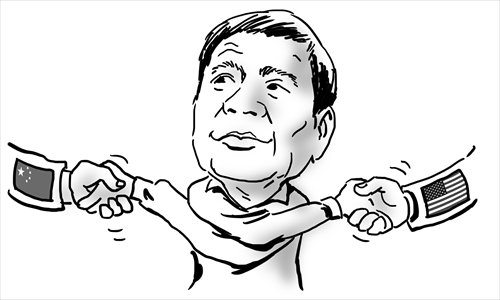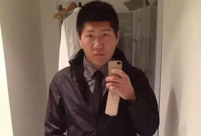


Illustration: Liu Rui/GT
As the big-mouthed Donald Trumpis giving the US elite a hard time, another politician's ascent might double Washington's concerns. Rodrigo Duterte, in a landslide victory on May 9, has become the next Philippine president. Notorious for unscrupulous and abusive remarks, Duterte was nicknamed "the Filipino Trump." He may even have gone further than Trump.
What's even worse is that Duterte seems not to be particularly attached to the US. He has no educational experience in the US. He is fed up with US military bases on Philippine turf, and he even threatened to cut off diplomatic relationships with the US and Australia when they denounced his inappropriate speech.
In contrast, he is quite close to the leaders of the illegal communist party of the Philippines and the Muslim rebel groups. In foreign affairs, he has proposed on different occasions to negotiate with China over the South China Sea dispute, an approach dismissed by the US, which is eager to use the Philippines to contain China. On Monday, the presumptive president-elect met with first batch of ambassadors, in which the Chinese ambassador to the Philippines was also included.
Will there be a turnaround to the US-Philippine alliance after Duterte assumes office in late June? Where will the three-party relationship between China, the US and the Philippines head?
As a hard-line nationalist, Duterte harbors a lot of hostility against the US military presence in the Philippines. Meanwhile, nationalism will also shape his stand on the South China Sea dispute. He boasted he would ride a jet ski to a disputed island occupied by China and stake out the Philippines' claims personally. In the last campaign event before the vote, Duterte accused Aquino of selling out to China, instead of proposing talks with China, to solicit more votes.
Besides nationalism, Duterte adheres to pragmatism in governance, and knows when and how to bend the rules. Although a former lawyer, he set aside the rule of law but adopted harsh executive measures to deal with the rampant crime in Davao City. As a highborn member of a political family, he behaved like Robin Hood and won overwhelming support from the grassroots. It is anticipated that he won't be as headstrong as Benigno Aquino III over the South China Sea dispute. He knows clearly that the Philippines stands zero chance to win in a physical confrontation with China, and a favorable award from the international arbitration won't give Manila any down-to-earth benefits except useless sympathy from the international community.
Pragmatism will drive Duterte to improve the Philippines' trade ties with China. Eager for foreign investments, Duterte even vowed to launch a constitutional amendment to clear the way for massive foreign investment. He showed appreciation to how China absorbed foreign capital, and will probably hope the Philippines can get more investment from China.
Meanwhile, pragmatism will prompt Duterte to maintain the alliance with the US. As a militarily weak nation, no matter what Duterte does, security threats such as the South China Sea dispute and the Muslim and Communist rebellions cannot be addressed overnight. Manila still needs a security umbrella provided by the US.
In the upcoming Duterte administration, the new government is likely to stick to the balance between China and the US. In security and political affairs, Manila will continue relying on the US, with the Enhanced Defense Cooperation Agreement remaining effective and the five US military bases holding their positions. While in economic affairs, the Philippines will continue trying to get more favors from China. But this purpose cannot be achieved without both sides finding an essential common ground in the South China Sea dispute.
The upcoming award of the arbitration will serve as a test for both China and the Philippines. Although Duterte is more pragmatic than Aquino over this matter, it is the Aquino government that will respond to the result. China will certainly launch countermeasures if humiliated by the verdict. At that time, the Sino-Philippine relationship will fall into a new impasse, and Duterte will find it more difficult to make a turnaround.
Washington should observe Manila's leadership change and policy transformation from a pragmatic perspective, instead of tying the Philippines on a chariot to challenge China. The Philippines can be friends with both China and the US, not a battlefield for two powerhouses.
 French girl ties the knot with Chinese boy
French girl ties the knot with Chinese boy Beijing Style: ready for bare legs
Beijing Style: ready for bare legs Century-old station sees railyway evolution
Century-old station sees railyway evolution Enthusiasts perform Kung Fu at Wudang Mountain
Enthusiasts perform Kung Fu at Wudang Mountain Stunning photos of China's fighter jets in drill
Stunning photos of China's fighter jets in drill Monk's mummified body to be made into a gold Buddha statue
Monk's mummified body to be made into a gold Buddha statue Former Chinese solider of the French Foreign Legion seeks wife online
Former Chinese solider of the French Foreign Legion seeks wife online Asia's longest and highest suspension bridge to open to traffic
Asia's longest and highest suspension bridge to open to traffic China's first interactive robot looks like a beauty
China's first interactive robot looks like a beauty Top 20 hottest women in the world in 2014
Top 20 hottest women in the world in 2014 Top 10 hardest languages to learn
Top 10 hardest languages to learn 10 Chinese female stars with most beautiful faces
10 Chinese female stars with most beautiful faces China’s Top 10 Unique Bridges, Highways and Roads
China’s Top 10 Unique Bridges, Highways and Roads EU decision seen harming China ties
EU decision seen harming China ties Society firmly rejects Cultural Revolution
Society firmly rejects Cultural Revolution Villagers living near Vietnam border are still haunted by war’s legacy
Villagers living near Vietnam border are still haunted by war’s legacy As Chinese sci-fi picks up steam, it’s finding fans around the world
As Chinese sci-fi picks up steam, it’s finding fans around the worldDay|Week